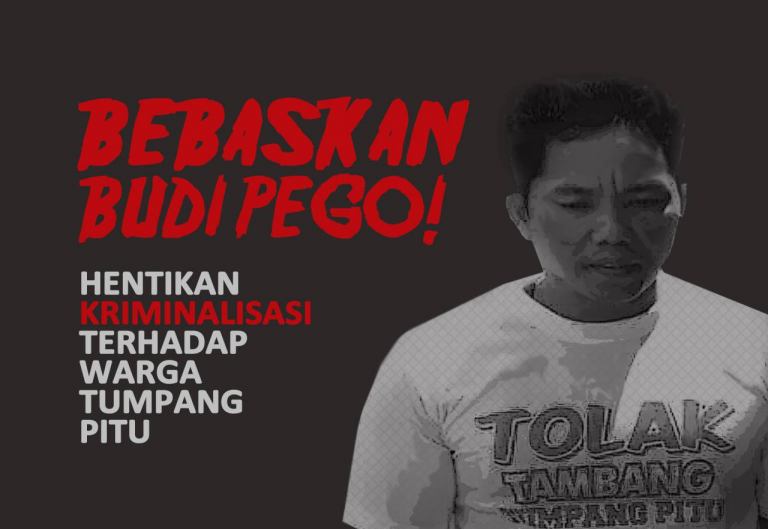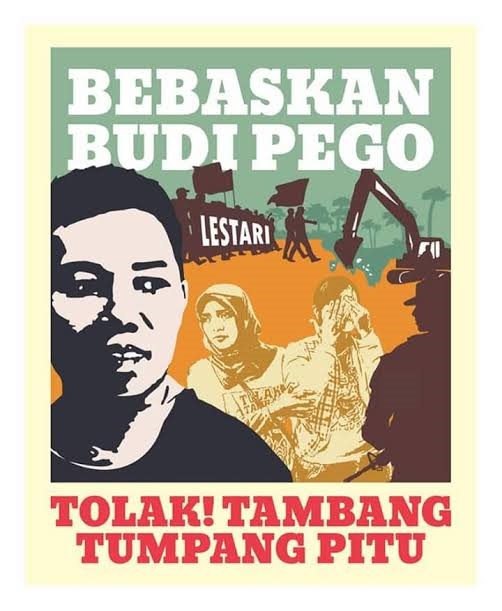Herlambang P Wiratraman
“Honourable panel of judges, once again, people's lives, happiness, prosperity and peace have been disrupted! The impact of the gold mining activities in the Tumpang Pitu protected forest area has caused real misery to the local community. I reject the mine because my life has been affected by the dangers of mining. I am fighting for a protected forest in the Tumpang Pitu mountain area, facing destruction by a gold mine”
Heri Budiawan
Appeal session, Banyuwangi, 9 January 2018
Two decades after the beginning of reformasi, anti-communist sentiment is still everywhere in Indonesia. Until today, ‘the ghost of communism’, or of the PKI (Indonesian Communist Party), is invoked to silence criticism and even to politicise legal issues. The role of the military is still often seen as ‘saving the nation’ and as the symbolic bulwark of political stability.
A political attack recently targeted a human rights and environmental defender from Banyuwangi, known as the sunrise city. There, in 2015, after a failed negotiation to stop gold mining in the region, local communities started publicly protesting against the environmental destruction caused by the mining operations. Subsequently, these local communities were regularly intimidated by thugs, or privatised gangsters. Heri Budiawan – known locally as Budi Pego – was one of the main protesters charged with communist activities. Even though he did not know what communism was about, he was accused of being involved in communist activities because he had carried a protest banner which featured a hammer and sickle, like the symbol of the PKI, which has been a prohibited political party since 1966. Budi Pego said he did not know who had painted the logo on the banner.
The evidence collected by the police included a pickup truck carrying eight banners, and a flash disk containing a video of the action recorded by Sidik Bintoro, a Banyuwangi 1 TV journalist. Based on this evidence Budi Pego was accused of spreading the idea of communism, a breach of Article 107a of the Criminal Code, known as the Communist Article. Since discussing communism is still taboo in post-1965 Indonesia, the accusation of communism is a very grave one and invoking this article has become an easy way to attack critical voices in society.
Initially, the Public Prosecutor (JPU) demanded seven years in prison for Budi Pego. After his arrest in September 2017, he was sent to the Banyuwangi Class IIB Correctional Institution, where he was kept in detention for five and a half months. Judges finally sentenced him for spreading communist propaganda during strikes, on account of the banner. The panel of judges concluded that Budi knew there were banners around bearing the hammer and sickle logo and he did not try to stop this. Throughout the trial, the banners in question were never seen.
Outside the courtroom, the accusation of communism was further reinforced by a group named Gerakan Anti-Kebangkitan Komunis, or GAKK (Movement Against the Rise of Communism). During the trial protesters with posters called out ‘Beware of the rise of PKI’ and ‘PKI is the enemy of the state and the people!’
A group of academics in Surabaya, however, has criticised the judges’ decision, stating that it was based on weak or even unclear legal reasoning. They argued that much remained unproven, including that the hammer and sickle on the banner fulfilled the legal criteria for ‘teaching or spreading communism’. Doing so would include seeking to ‘overthrow a legitimate government’, which the group says the facts of the case do not suggest Budi was doing.

The ghost of communism
Communism has been a forbidden ideology in Indonesia since a 1966 MPR (People’s Consultative Assembly) decree on the dissolution of the PKI. The invocation of the ghost of communism instils deep anxiety in large parts of Indonesian society to this day and therefore remains a powerful tool. In the case of Budi Pego, those in power invoked communism to silence protesters and shift attention away from environmental issues.
Regardless of the political stigma, the court has failed in the protection of human rights, and failed to protect the defenders of environmental rights, who are due protection under Indonesian law No.32/2009 wherein Article 66 stipulates that ‘every person who fights for the right to a good and healthy environment cannot be prosecuted with a criminal charge or civil suit’. It is thus clear that this judicial decision has failed to protect the constitutional rights of a citizen according to Indonesian law.
A significant case
The possible effects of this decision are worrisome. Most importantly, the upholding of this leveraging of the communist stigma will make people afraid to criticise injustices done to their communities. There are three further reasons that make this case especially significant for Indonesia’s legal history as well as for assessing the current development of human rights in Indonesia.
Firstly, it was the first time that the stigmatisation of an ideology, in this case communism, has been used to help apply criminal charges under the newly revised Indonesian Penal Code of 1999. Previously, citizens have instead been stigmatised as communists without due process of law, which has sometimes resulted in non-judicial killings, kidnapping, imprisonment and violence and – in the case of 1965 killings – mass slaughter. What Budi’s case shows is how the judiciary itself can be deployed as a tool for criminalising people, even in Indonesia’s democratic system.
Secondly, in 2015, the president of the mining company that Budi Pego protested against was AM Hendropriyono, a former BIN (Indonesia State Intelligence Agency) commander with a dubious human rights record. Currently, Hendropriyono’s son is on the board. This reveals the corporate and military power dynamics that could get entangled with human rights cases.
Thirdly, the area where Budi Pego’s incident took place is historically significant. Banyuwangi has traditionally been home to more Nahdlatul Ulama (NU) followers than those of other Muslim groups. NU, as an Islamic organisation, had been involved in violent conflict with the PKI. Severe violence took place in Banyuwangi during the mass murders of 1965-66. In addition to those events, Banyuwangi also saw mass violence during the early years after Suharto stepped down, including the ‘dukun santet’ (sorcerer) cases and the 1998 East Java ninja scare. During the latter, mysterious ninjas were blamed for a series of killings of religious teachers, Islamic boarding school leaders, and people with mental illnesses.
Every year, youth and other residents of Banyuwangi, including the Ansor Youth Movement, remember ‘the ferocity of the PKI’ with a ceremony at the Pancasila Jaya Monument, nearby Lubang Buaya (crocodile hole) in Cluring, Banyuwangi. The text on the Pancasila Jaya Monument reads: ‘Here on 18-10-1965 there was a mass murder of 62 Pancasila Youth members by the savagery of the G30S and the PKI’.
The modern-day politicisation of communism continues what started with the violence in 1965. The spectre of the PKI did not disappear with the collapse of the New Order. Instead, we are witnessing its return in the courtroom. Budi Pego’s case reveals how the legacy of Suharto’s authoritarianism keeps affecting social life and citizenship in Indonesia. In his case, the law has been used to instrumentalise the ‘communist stigma’ in order to attack the human rights movement and environmental rights activism. The use of ‘communism’ as an accusation in court is a sign of the dangerous politicisation of the judicial system.
Herlambang P Wiratraman (herlambang@fh.unair.ac.id) is a senior lecturer at the Centre of Human Rights Law Studies, Faculty of Law, Airlangga University.
